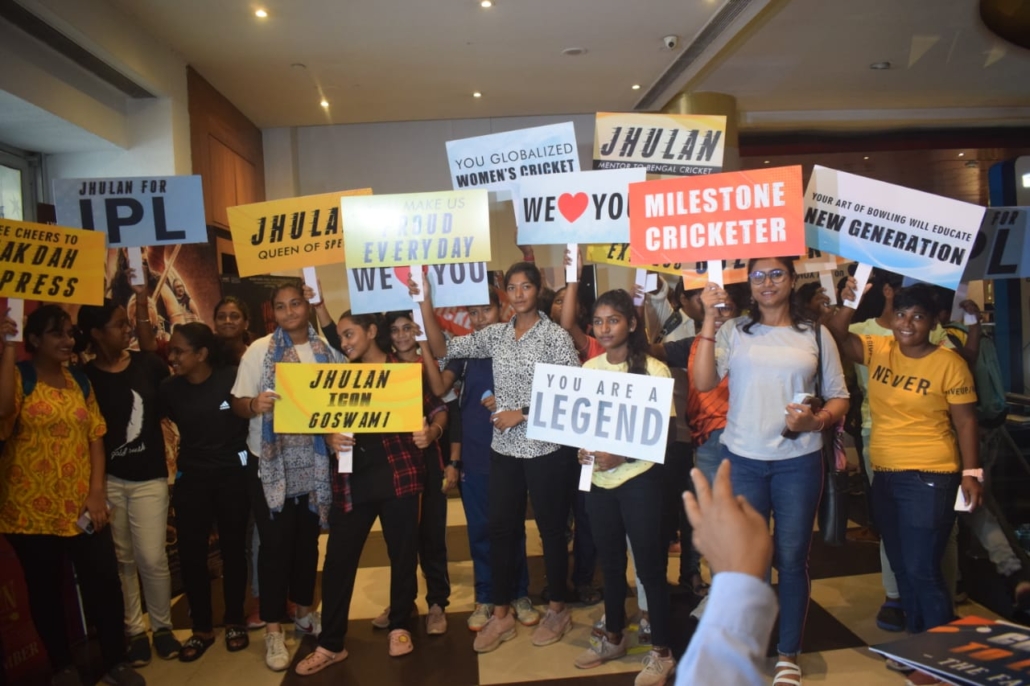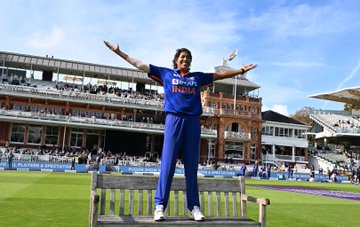Jhulan Goswami’s exit ends the Miljhul raj in Indian cricket
An elite sportsperson would always like to sign off from his or her playing arena rather than the confines of a press conference. The end may not always be a fairytale one, but it gives them a chance to get one last feel of the familiar turf where they have shed the blood and sweat for years – as Jhulan Goswami will surely agree after Saturday.
The impact of the last international match of Chakdah Express, in what was her 264th One-day International at the Lord’s, resonated strongly with the cricket family throughout the day. It was a fantastic gesture from Indian skipper Harmanpreet Kaur to bring along Goswami at the toss – a practice which may have now come to stay for such larger-than-life performers’ farewell matches – while the England team’s guard of honour when the highest wicket-taker in the 50-overs format was coming out to bat was a touching one.
Well, the tall, ever-smiling and relentless pacewoman deserved every bit of it after being at the top of her game for 20 long years. Her records speak for themselves, but what’s more important is that the 39-year-old had been a barrier-breaker who showed a Indian women’s pace bowler can survive the rigours of international cricket for so long with focus, discipline and knowing one’s body.
Back in Kolkata, her home state association Cricket Association of Bengal (CAB) showed a sense of occasion by announcing their plans to name a stand after her at the Eden Gardens – an honour so far bestowed only on former Indian captain Sourav Ganguly. If it happens, it will be an iconic moment for women’s cricketers in India.

Talk of Jhulan, it’s impossible to keep out Mithali Raj – her teammate for these two decades – and no words of praise can be enough for these two iconic figures for the Women in Blue. As both signed off this year (Mithali did so in June), both did so with a regret in their hearts of not being able to lay hands on the ICC World Cup despite making the final twice.
In their book The Fire Turns Blue, an extremely well-researched work on the history of women’s cricket in India, journalists Karunya Keshav and Sidhanta Patnaik have addressed the duo as MilJhul (meaning together in Hindi) and summed up their journey objectively. ‘‘Aptly, miljhul means together; nobody else’s fate in Indian women’s cricket has been as intertwined as that of the duo. When the game needed somebody to be the best, to drag Indian cricket from the amateur, lackadaisical era of the ‘90s into the professional period of the 2000s, it was lucky to get Miljhul, two of the most thorough professionals,’’ they wrote.
‘‘Aptly, miljhul means together; nobody else’s fate in Indian women’s cricket has been as intertwined as that of the duo. When the game needed somebody to be the best, to drag Indian cricket from the amateur, lackadaisical era of the ‘90s into the professional period of the 2000s, it was lucky to get Miljhul, two of the most thorough professionals’’
Much like their fascinating journey together, the duo had been recently in the news for their biopics – an acknowledgement of the fact that the stories of their struggle in breaking the gender stereotypes and their achievement on the world stage has the makings of an absorbing reel-life story.
The stories of their early days, of course, are like chalk-and-cheese. If Mithali was brought up by an ex-serviceman father in the urban environment of Hyderabad, Jhulan was born in the sleepy suburban town of Chakdah in North 24 Parganas of West Bengal (this explains the working title of the film on her: Chakdah Express). In the early ‘90s, taking up cricket as a sport in the state of Bengal needed some courage of conviction but then Jhulan found her calling when she was picked as a ball girl in the 1997 Women’s World Cup final at the Eden Gardens.
Watching Catheryn Fitzpatick, one of the alltime Australian pace bowling greats, in that final gave her a sense of purpose and soon enough – her tryst with tennis ball cricket began at a local club. Call it a sense of destiny or what you will, Jhulan had long overtaken Fitzpatrick (180 wickets) in the 50-overs game and ended at 255 wickets.
Take a bow, Jhulan Goswami!





Real achiever in a sport hitherto dominated by men…Almost 2 decades in the fame speaks if her immense contribution..
Please read fame as game and if as of